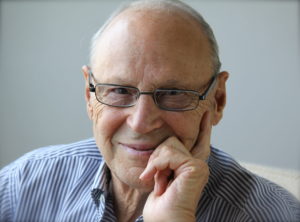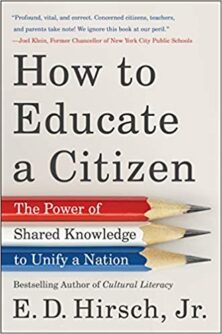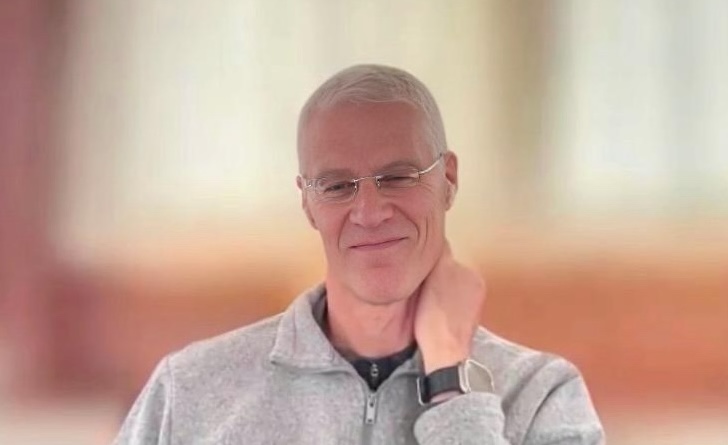“Farewell book” by E. D. Hirsch, Jr., underscores role of history and civics education in developing shared knowledge necessary to be a nation. Philanthropy can and should help.
How to Educate a Citizen: The Power of Shared Knowledge to Unify a Nation is the latest contribution of E. D. Hirsch, Jr., to his seemingly endless bibliography of books, reports, public-policy research papers, and opinion essays dedicated to explaining how K-12 American public schools have failed to educate the nation’s children.
Hirsch is a professor emeritus of education and humanities at the University of Virginia and founder of the Core Knowledge Foundation. He is most recognized for developing the concept of “cultural literacy”—the idea that reading comprehension requires wide-ranging background knowledge. His 1987 book Cultural Literacy: What Every American Needs to Know established him as the most-prominent and, for that matter, preeminent advocate for educational traditionalism—which schools have lacked, he believes, hence their failure.

Hirsch’s work has been praised widely for its clear, common-sense, “what-works” approach to what should happen in elementary and high-school classrooms, and it’s been criticized widely for its failure to understand that children and young adults require individualized assessment and curricular approaches in K-12.
Many on the left consider his core-knowledge curriculum anti-pluralistic. Some on the right think his approach near totalitarian, since it calls for considerable federal government interference in local control of education.
What’s been “child-centeredly” done
The timing of How to Educate a Citizen, Hirsch’s “farewell book,” could not be better. It comes at the end of a tumultuous presidential campaign during which America’s identity was an issue, and in which the liberal Democrat candidate famously said, maybe mistakenly, “We choose truth over facts.”
Hirsch’s larger critique of the country’s K-8 schools has always specifically lamented what progressive administrators and teachers have done to diminish development of a baseline “gut” intelligence—without which students’ identity as Americans cannot really be formed. And our identity crisis likely will continue far beyond 2020. It may well worsen.
The ubiquitous progressive educational approach, as it’s promoted by college and university schools of education, is “child-centered learning.” Indoctrinated in and using the approach, teachers “have gradually abandoned teaching knowledge coherently in favor of teaching mush on the scientifically incorrect premise that they are imparting general reading skills and general critical-thinking skills,” according to Hirsch. “But by neglecting their citizen-making duties, they are in fact diminishing our national unity and basic competence.
“History, geography, science, civics and other essential knowledge that is the mark of an educated citizen has been dumbed down by vacuous learning ‘techniques’ and ‘values based’ curricula,” he continues. “The results have been devastating: It’s not simply a matter of ignorance …. The result is also the loss of a shared knowledge base across the nation that would otherwise enable us to work together, understand one another, and make coherent, informed decisions at the local and national level.”
In other words, to each and everyone their own truth—which, so many of us have now been child-centeredly educated, can be chosen over facts. Naturally enough, there has thus been an ultimate and unmistakenly serious undermining of e pluribus unum; diversity has trumped unity to its own, and our, detriment.
What is to be done now?
Hirsch insists in How to Educate a Citizen that traditional, shared knowledge has to be incorporated into a curriculum that exhibits coherence over time, grade by grade, by topic sequence, and with richness of content. In his view, reaching agreement on knowledge-based education reform will require the work of a group of respected, nonpolitical organizations. These groups, first and foremost, must create a specific, model, grade-to-grade curriculum, accompanied by online texts, and with teacher guides and student aids.
The goal is nothing short of sparking—once again, and in students and teachers alike—a sense of moral obligation to the well-being of American society. A new and better, civics-informed, knowledge-based curriculum would and should foster a renewed feeling of belonging to one nation.
Philanthropy would and should help, despite the “donor fatigue” that many grantmakers may be feeling in the education area. Milwaukee’s Lynde and Harry Bradley Foundation, where I and my Giving Review co-editors worked, always placed great importance on the teaching of American, Western and world history. The foundation tried to improve the quality of materials used in the classroom (textbooks and primary- and secondary-source materials), for example, as well as teacher preparation and content delivery. It also sought to increase professional-development opportunities for history and civics teachers.
Among others, the foundations’ specific history and civics initiatives included The Bradley Commission on History in Schools, the Library of Congress’ American Experience Project, The Gilder Lehrman Institute of American History’s creation of “history high schools,” and The Bradley Project on America’s National Identity and its E Pluribus Unum report. The Giving Review has tried to keep, and tried to keep you, abreast of these, other, and new grantmaking options in history and civics. With others, we’ll continue those efforts.
Engaged and heeded
Timely indeed is Hirsch’s How to Educate a Citizen, given our identity crisis—which has itself been a long time in coming, but is here. Better-educated citizens would better debate the nature of our regime, the symbols enshrined to memorialize its past, the motives of those who founded and have perpetuated it—and how, and whether, our legacy should be passed on to future generations, and by whom.
The New York Times’ 1619 Project and the Woodson Center’s 1776 Unites project, for example, present two competing visions of American history. They are having and will continue to have, perhaps along with others, an impact on the current and future educational administrators and teachers, parents, and students.
Hirsch’s “farewell book” essentially again asks, but maybe more pointedly, who are we? The question, now urgently, needs to be engaged, including by philanthropy. And Hirsch’s lifelong admonition to build a solid foundation of core knowledge among us all needs to be heeded, by us all.



